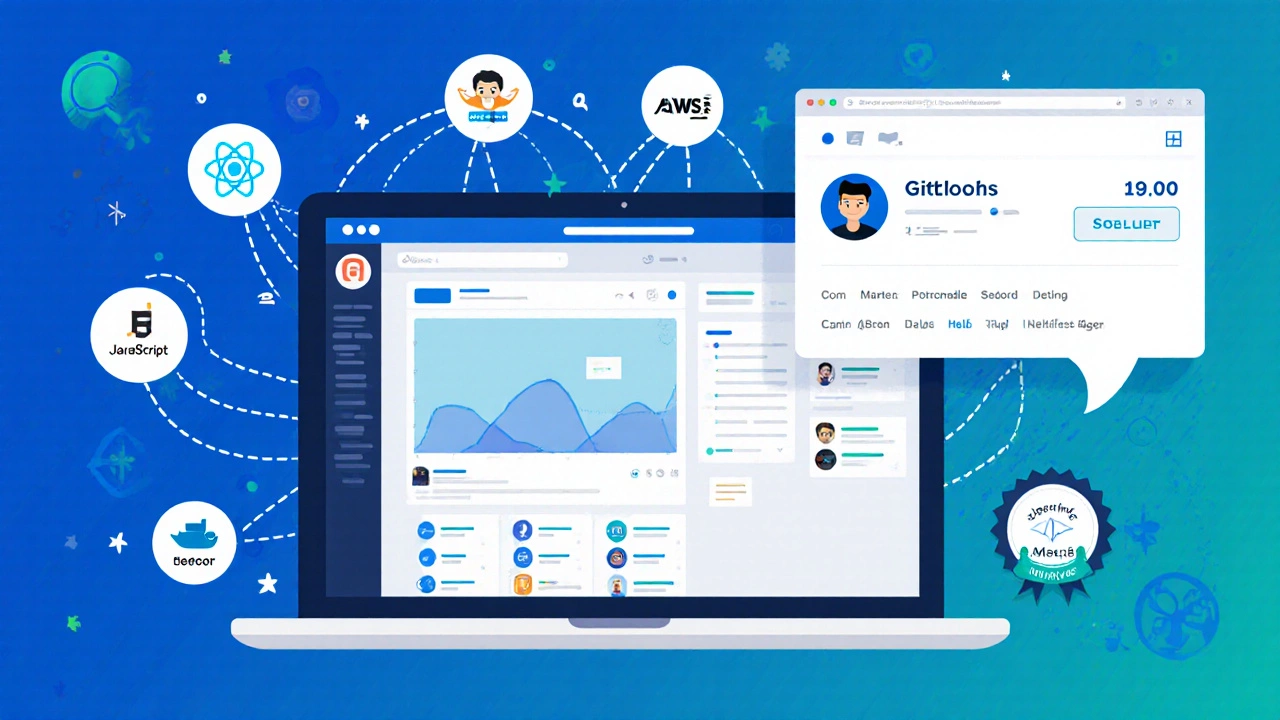
Salary Estimator for Self-Taught Developers
Estimate your potential entry-level salary based on the latest industry data. This tool uses information from the 2025 market analysis featured in the article.
Estimated Entry-Level Salary:
When you hear the phrase self‑taught coder is someone who learns programming without a formal university degree, often using online tutorials, books, and projects, the first question is usually: do they actually get hired? The answer isn’t a simple yes or no - it depends on what you showcase, where you look, and how the hiring landscape has shifted in the past few years.
Key Takeaways
- Employers care more about proven skills and real‑world projects than diplomas.
- Building a strong portfolio and contributing to open source can offset the lack of a degree.
- Bootcamps and certifications help but aren’t mandatory for landing a job.
- Networking and personal branding often open doors that traditional applications miss.
- Remote work trends have widened opportunities for self‑taught developers worldwide.
Why Skills Beat Papers in 2025
Data from the 2024 Stack Overflow Developer Survey shows that 68% of hiring managers rank practical experience above a computer‑science degree. Companies have realized that software development is a skill‑first profession. The rise of Bootcamp is an intensive, short‑duration training program that focuses on job‑ready coding skills and the explosion of freelance platforms have proven that many developers can deliver production‑grade code without a four‑year diploma.
What Recruiters Look For
Recruiters scan resumes for keywords like "JavaScript", "React", "AWS", and "Docker". More than half admit they skim past education sections unless the candidate lists a relevant degree. What catches their eye is a well‑structured Portfolio is a curated collection of live projects, code snippets, and case studies that demonstrate a developer's abilities. A portfolio that includes a Technical interview is a series of coding challenges, system‑design questions, and problem‑solving exercises used by employers score extra points when the candidate can discuss the decision‑making behind each solution.
How Open Source Can Bridge the Gap
Contributing to Open source contribution is the act of submitting code, documentation, or bug fixes to publicly available software projects is one of the most credible ways to prove competence. A solid GitHub is a cloud‑based platform for version control and collaborative coding, often used as a public résumé for developers profile, showing consistent activity, pull‑request acceptance rates, and collaboration with other engineers, signals to recruiters that you can work in a team setting.

Remote Work Has Redefined the Hiring Map
Post‑pandemic, 45% of software teams operate fully remotely. This shift means geography no longer filters candidates as tightly as before. A self‑taught developer in Wellington can now interview for a startup in San Francisco without relocating. However, remote roles often require clear communication, time‑zone overlap, and a track record of delivering code independently - all of which can be demonstrated through a strong portfolio and open‑source history.
Formal Credentials vs. Self‑Study: A Side‑by‑Side Look
| Metric | Self‑Taught Path | Formal Degree Path |
|---|---|---|
| Average time to first offer | 4‑6 months (portfolio‑driven) | 6‑9 months (degree‑focused) |
| Typical salary (entry‑level) | $78,000 (US) / $95,000 (NZ) | $72,000 (US) / $88,000 (NZ) |
| Interview pass rate | 65% (tech‑challenge focus) | 58% (resume filter focus) |
| Retention after 2 years | 82% (high engagement) | 75% (varied motivation) |
The numbers suggest that self‑taught coders can compete on speed, salary, and longevity when they back their learning with demonstrable work.
Common Pitfalls and How to Avoid Them
- Over‑reliance on certifications: While a Certification is a credential issued by a recognized training provider to verify specific technical skills like AWS Certified Solutions Architect looks good, it won’t replace a real project. Use certificates as supplements, not the core of your résumé.
- Neglecting soft skills: Employers value communication, teamwork, and problem‑solving. Highlight these in your cover letter and during interviews.
- Ignoring networking: A strong Networking is the process of building professional relationships through events, online communities, and referrals strategy can land you referrals that bypass applicant‑tracking systems.
- Underestimating Employer bias is the unconscious preference some hiring managers have for candidates with formal education: Address it head‑on by emphasizing measurable outcomes - e.g., “Reduced page load time by 30% in project X”.

Actionable Roadmap for Self‑Taught Coders
- Pick a specialization (frontend, backend, DevOps, data science) and master the core stack.
- Build 3‑5 real‑world projects; host them on a personal domain and link the code on GitHub.
- Contribute to at least two open‑source libraries; aim for merged pull requests.
- Create a concise one‑page résumé that highlights technologies, project impact, and GitHub stats.
- Join developer communities (Discord, Reddit, local meetups) to practice networking and discover job leads.
- Practice technical interview platforms (LeetCode, HackerRank) for at least 30 minutes daily.
- Apply to remote‑first companies and startups that value skill over pedigree.
Following these steps turns a self‑directed learning journey into a marketable professional profile.
What the Data Says About Long‑Term Success
A 2023 study by Indeed tracked 10,000 hires across the US and New Zealand. It found that developers who entered the field without a degree had a 9% higher promotion rate after two years, largely due to the continuous learning mindset they cultivated during their self‑teaching phase.
Mini FAQ
Do employers really ignore a lack of degree?
Most tech firms prioritize demonstrable skills. While some large enterprises still list a degree as a requirement, they often waive it if a candidate shows strong project work and relevant experience.
How important is a portfolio compared to a resume?
Your portfolio is your living résumé. Recruiters spend seconds on a resume but will click through to a live demo or GitHub repo before deciding to move you forward.
Are coding bootcamps worth the investment?
Bootcamps can accelerate learning and provide career services, but they’re not a magic ticket. Pair the bootcamp curriculum with personal projects for the best outcome.
Can I get hired without any formal certification?
Yes. Many hires are made solely on portfolio quality and interview performance. Certifications help when you need to prove niche expertise, like cloud security.
What entry‑level salary can I expect as a self‑taught developer?
In 2025, entry‑level salaries range from $70k‑$80k in the US and $90k‑$100k NZD in New Zealand, often matching or exceeding those of degree‑holding peers.
Bottom line: being self‑taught doesn’t block you from a tech career. Focus on tangible evidence, keep learning, and the hiring doors will open-especially if you give the self‑taught coders label a badge of grit and independence.
More Articles

Understanding Low Salaries in Government Services and Their Impact
The article dives into the reasons behind low salaries for government services, focusing on factors like budget constraints and traditional pay structures. It also explores how these salaries compare to the private sector and the implications for job seekers. Tips for aspiring government employees to navigate these challenges are included. The piece aims to help readers make informed decisions on pursuing government careers.

Which Branch of MBBS Is Highest Paid? Your Guide to Smart Career Choices
Trying to pick the highest paid branch after MBBS? This article breaks down which specialties top the salary charts and what influences doctors' pay in India. It covers how competition, demand, private vs government jobs, and additional qualifications can change your earning potential. Get useful facts, real-world salary ranges, and tips for making a smart choice after NEET. Make a practical plan for a rewarding medical career beyond the entrance test.

MBBS Doctor Salaries in India: Insights and Influences
Exploring the salary prospects for an MBBS doctor in India offers a unique glimpse into the varied and evolving medical landscape. The financial outcome for doctors varies significantly depending on experience, specialization, and location. With the rise of NEET coaching and medical training avenues, young aspirants often wonder about the financial rewards and challenges of pursuing this noble profession. Understanding what factors influence a doctor's earnings can help guide potential medical professionals in shaping their career paths.
